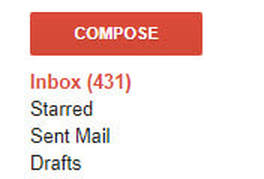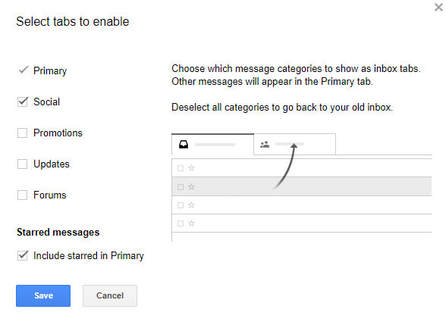#1 What's in there now? Is your inbox filled with things you want to read "later"? Realistically speaking, if your later was not 2 days later, then you are not going to read it. ARCHIVE IT! Then you can type a keyword in the search if you ever need to read about that topic. Informational emails like articles, sales material, and updates are often repetitive and time sensitive. When they sit in your inbox for days/months they lose all of their value. #2 Use a Sorter. Most online inboxes have options for sorting email. You can select in Gmail if you want to sort your emails in preset categories. This is a great start for reviewing a really huge number of emails. It is also great for maintenance especially if you have several social media accounts that you monitor regularly. Keep in mind, most email programs also have internal filters that look at your behaviors and try to do those repeated actions to make you more efficient. For example, when you mark emails for a specific sender as important, soon your email system will start to mark them as they come in. #3 Start Fresh with a Schedule. I was visiting a good friend and during our conversation she needed to find an email about an event we were going to attend. She opened her inbox, and she had 18,000+ emails. My heart stopped for at least five seconds. I gasped! I asked, how are you going to manage that? She said, I will go through them one day. Do you see how overwhelming that could be? Realistically speaking - she will never go through those emails. It was time to "set her free". I asked her to archive them all and start fresh. A few days later, she called and thanked me. She said it was like a weight has been lifted. Remember you can still search for the sender or topic when you archive emails so set yourself free. If it is important, you can find it. If you did not act on it immediately or did not print it if it is extremely important, archive it at the end of the day or week. Get on a schedule. Daily may be a bit too often if you get a lot of email but weekly will be a great option too. Some people even do monthly. You decide what time schedule is best for you based on the importance and frequency of your emails. #4 Cut the Clutter. Do you have a plan for unnecessary emails? Each email sent from a business will have an unsubscribe. Our lives change often and so do our interests. If you lived in "Golf Village" ten years ago and have moved, you do not need to continue to get the community newsletter. Use the power of "Unsubscribe" to be proactive about what emails enter your inbox in the first place. #5 Have separate email accounts. Some people like to have one email account that they check regularly, but often the line between personal and professional emails gets blurry. You do not want emails from your kid's school to go to your work email. Remember work email is not private. The company is able to access it or if you work in a government office, it is public record. Even if you are a business owner, you need to filter important emails from personal ones. Start your journey to email freedom today!
0 Comments
|
AuthorHello There! Categories
All
Archives
June 2022
|





 RSS Feed
RSS Feed
